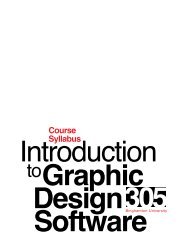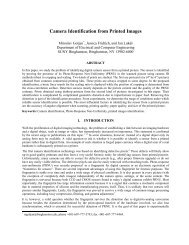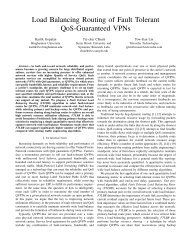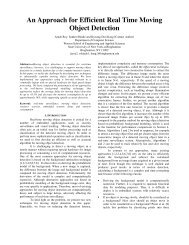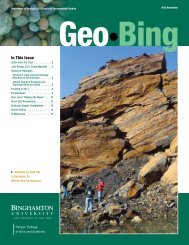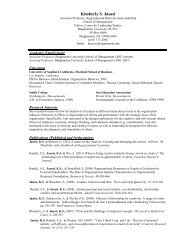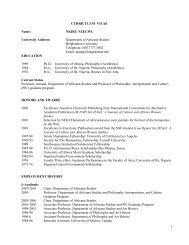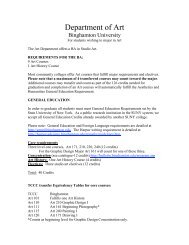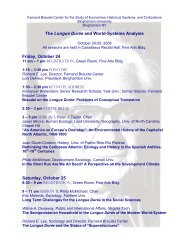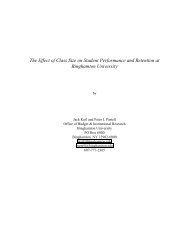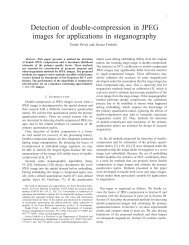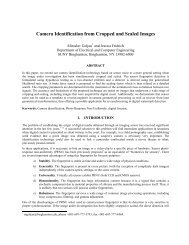Volume 8, Issue 1 Fall 2010 — Special Edition - Binghamton ...
Volume 8, Issue 1 Fall 2010 — Special Edition - Binghamton ...
Volume 8, Issue 1 Fall 2010 — Special Edition - Binghamton ...
Create successful ePaper yourself
Turn your PDF publications into a flip-book with our unique Google optimized e-Paper software.
10 Institute of Global Cultural Studies, <strong>Volume</strong> 8, <strong>Fall</strong> <strong>2010</strong>… Ali A. Mazrui in History and Politicsing descriptions. Sadly, some of these writerssuffered for their radical or ideological stancesand struggles in the interests of Africa as a continentand, to them, as a motherland. For example,Nkrumah, who was himself a prolific writerand a fierce fighter in the anti-colonial struggle inAfrica, suffered in a variety of ways. In the end,he had his elected government in Ghana overthrownon February 24, 1966 in a military-cumpolicecoup d’état that was, reportedly, engineeredby Western intelligence agencies (asdocumented in former CIA operative JohnStockwell‘s book, In Search of Enemies).As discussed in Kwame Nkrumah: PanafGreat Lives (1974) and in some of ProfessorMazrui‘s writings, Nkrumah eventually died inApril 1972 in faraway Bucharest, Romania, fromwhat Amical Cabral of Guinea-Bissau termed asa ―cancer of betrayal‖ (1974). Several other blackleaders and scholars, too, suffered in a variety ofways. For example, Finally They Killed Him(1980) was a book written by Nigerian scholars todocument several aspects of the brutal assassinationof Guyana‘s History Professor Walter Rodney,who penned How Europe UnderdevelopedAfrica (1968), a forceful indictment of Europeanforces that, in his opinion, kept Africa in the domainof what Conrad saw as a ―dark‖ continent;Dr. Mazrui has an affinity to him, including servingas a Rodney Professor in Guyana. Anotherblack nationalist scholar, who died from a mysteriousillness, was Franz Fanon, author of severalgreat works, including The Wretched of the Earth(1964).As the occupier of Albert Schweitzer EndowedProfessorship in the Humanities in theState University of New York (SUNY), with residenceat <strong>Binghamton</strong>, New York, Dr. Mazrui hasbenefitted from several prestigious invitations tocollege campuses. During such visits, he performsto his best and makes the name of Africashine, just as he did when, in 2009, his stellarachievements prompted the Indiana UniversityAfrican Students Association (IUASA) to bringhim to our campus. He held his large audiencespell-bound. It was similar to how both of us had,in an earlier period, successfully nominated andbrought on the Bloomington campus of IndianaUniversity (headed today by a stellar philosophyscholar, Provost Karen Hanson) two Nobel Laureates:Nobel Literature Laureate Wole Soyinkaof Nigeria and, later on, Costa Rican PresidentOscar Arias, the Nobel Peace Prize Laureate.In spite of Professor Mazrui‘s distinguishedPan-African scholarship and his ardent promotionof African culture, customs and ideals, he hasIGCS Director Ali A. Mazrui being awarded the Order ofthe Grand Companion of Oliver Tambo by former SouthAfrican President Thabo Mbeki, April 2007.had his share of African and diaspora-basedBlack critics for varied reasons. For example,some West African scholars, who admireGhana‘s late President Nkrumah (the Osagyefo)have never forgiven the famous Kenyan scholarfor writing an essay in the early years of TransitionMagazine, titled ―Nkrumah: The LeninistCzar,‖ which depicted Nkrumah as a ―Czar‖ ofsort in Africa. To such pro-Nkrumah critics ofMazrui, it was a ―how dare him‖ episodic issue.Yet, that did not dent the intellectual spirit or credentialsof Professor Mazrui, who had previouslybeen faulted because, to his ardent critics, hefirst rose to intellectual prominence by beingseen as a critic of some of the accepted orthodoxiesof African intellectuals between the 1960sand 1980s; he was also seen as an ardent criticof African socialism and Marxism, brands ofwhich Nkrumah as well as Tanzanian ex-PresidentJulius K. Nyerere and others practiced.Ali. A. Mazrui: Some Essential DetailsIn the 2005 global intellectual poll, ProfessorMazrui was ranked among 99 other distinguishedfigures, as being one of the world‘s top 100 publicintellectuals by readers of the United KingdombasedProspect Magazine and the WashingtonDC-based Foreign Policy Magazine. Yet, thosewho very well know the University of Oxford‘sNuffield College-educated political scientist add tothe public intellectual description a further descriptionof an ―organic intellectual.‖ In politicalscience dictum, it is Antonio Gramsci, who introducedthe concept, which has been applied toRodney in the superb writings of Caribbean‘sTrevor Campbell (1981); Horace Campbell (1991);and Nigeria‘s astute scholar, Biodun Jeyifo (1980).We have a purpose for adding the ―organicintellectual‖ accolade to Mazrui‘s public intellectualdistinction. In fact, we do not want to limithis intellectual precision and importance, hencewe have not added ―traditional intellectual‖ aspart of the accolade. For, as we understand itfrom Gramsci‘s perspective, traditional intellectualscan be seen as literary as well as scientificand religious persons, whose positions in intersticesof one‘s society has a certain inter-classaura about it. However, as Hoare and Smithhave been quoted as having underscored inLewis‘ book about Walter Rodney (1998), traditionalintellectual ―derives ultimately from pastand present class relations and seals an attachmentto various historical (and political) classforms.‖Instead, for various reasons, we see Dr.Mazrui as being both, a public intellectual and toa large extent, and an organic intellectual, especiallywith his contributions to Africa and the Developing(or Third) World. As variously amplified,the organic intellectual — of the Mazruian variation— happens to be, again in the words ofHoare and Smith (1978), the ever thinking andorganizing elements of a particular aura specificfundamental social class, who can be ―distinguishedless by their profession, which may beany job characteristic of their class, than by theirfunction in directing the ideas and aspirations ofthe class to which they organically belong.‖Unlike Rodney, who Columbia University ProfessorManning Marable (1986; 1987) as being partof the black intellectual tradition, Mazrui has afirebrand intellectual prowess as opposed toradical or revolutionary one.While Rodney and others used both astuteand propagandist scholarship in the interests ofblack people, Mazrui has purposely utilized hispolitical science expertise to bring Africa andother Developing (or Third) World areas into thefocus of the enlightened world. In fact, it is due tothe crusading writings of Mazrui and other blackintellectuals that is why today, we do not continueto hear some of the ridiculous questions of thepast about Africa; i.e., whether Africans live intrees, or whether Africans have tails, as depictedin some Tarzan movies. For example, in herexcellent memoirs, Living History (2003) — publishedimmediately after being America‘s FirstLady — U.S. Secretary of State, Hillary RodhamClinton, pointed out the importance of Americanslearning more about Africa. She was, indeed,pointing out several objectives for her fellowAmericans (before her departure for Africa, with



